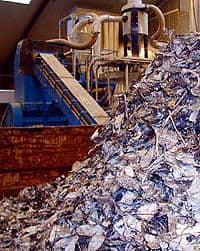In a bid to get the WEEE system for 2007 wrapped up, a period of extra time had been allowed last week until Friday July 4 at 3pm for schemes to obtain evidence. Now, the issue of whether WEEE schemes have complied for 2007 in getting enough evidence is to be assessed by the environment agencies.
And, while attention is focusing on whether all schemes have complied, BERR – the Department for Business – and the agencies – the Environment Agency and its Scottish counterpart SEPA – have issued a letter which attempts to clarify their view on legislation covering the collection of WEEE and the evidence raised from it.
The letter and the period of extra time for acquiring evidence stems because of some schemes being short of evidence and some having too much.
Over recent months attention has focused on the the fact that the Electrolink compliance scheme, working mainly with Viridor, had secured access to a large number of civic amenity sites and consequently a large amount of WEEE recycling evidence. But, this meant it had far more evidence than it needed to meet the requirements of its own members. In contrast schemes such as Repic had a fewer number of sites and less ready access to evidence.
Short
About six compliance schemes were short of evidence, notably Repic and also ERP and Transform. Agreement between the schemes and Electrolink has been protracted over costs and contractual conditions. Now it is understood that some schemes did opt to buy evidence from Electrolink during the extra time period.
The issue of what happens now to schemes who are deemed not to have complied will fall to the environment agencies who could seek to deregister them and also any associated schemes.
Whether legal challenges would then be raised is a possibility, as some schemes are thought to consider that the way the system operated, with schemes allowed to have more evidence than they needed as being unfair. On the other side of the coin, some involved in the system consider that schemes who have been short of evidence should have made more effort to tie up more civic amenity sites.
The letter sent out by BERR, the Environment Agency and SEPA tackles the issue lying at the heart of the current debate.
It notes how the first compliance period was “a settling in and learning experience for all those involved”. The letter then says it is the three parties are looking to remind producer compliance schemes of their obligations and what operational plans are expected to contain.
BERR, the EA and SEPA highlight three paragraphs of the regulations contained at schedule 7, part 4. The first – paragraph 3 – tells how the operator of a scheme has to co-operate with others. The third paragraph – paragraph 6 – is broader and indicates that the scheme is likely to assist meeting the UK's WEEE obligation.
Viable plans
The second paragraph – paragraph 4 – is the most crucial. This states: “The operator of the proposed scheme or schemes has viable plans to collect an amount of WEEE that is equivalent to the amount of WEEE for which it will be responsible for financing under these regulations.”
Interpretation of this paragraph, one WEEE expert told letsrecycle.com, could be seen as meaning that schemes who did not have plans to collect enough evidence – or alternatively those that had too much – were potentially in breach of the regulations.
However, it seems likely that any schemes who had insufficient evidence after last week's final round might argue that they did have plans to buy evidence but it was too expensive. And, in contrast schemes who had too much might argue they did have enough for their members and were willing to sell the surplus.
Trading
However, the letter goes further and tackles the issue of trading. Attention is drawn to the word “equivalent” in paragraph 4 as meaning that “schemes should not be putting forward plans which result in significant over or under collection in relation to their obligations.” And, it is also stressed that “this relates to amounts of WEEE collected not the level of evidence obtained by schemes after trading… it is therefore not acceptable for operational plans to centre on the trading of excess evidence either during the compliance period or in the settlement period up to the end of May.”
The letter does not give any indication of how any non-compliance with 2007 requirements will be met. But, it does suggest that operational plans will have to be changed if there is a need for schemes to have more of their own contracts with civic amenity sites or less. However, whether this will happen in 2008 is seen as unlikely because contracts are already in place with most local authorities, although a number are considering their options.
BERR has previously indicated that any schemes failing to achieve compliance would be subject to “vigorous enforcement action” from the regulators (see letsrecycle.com story).












Subscribe for free